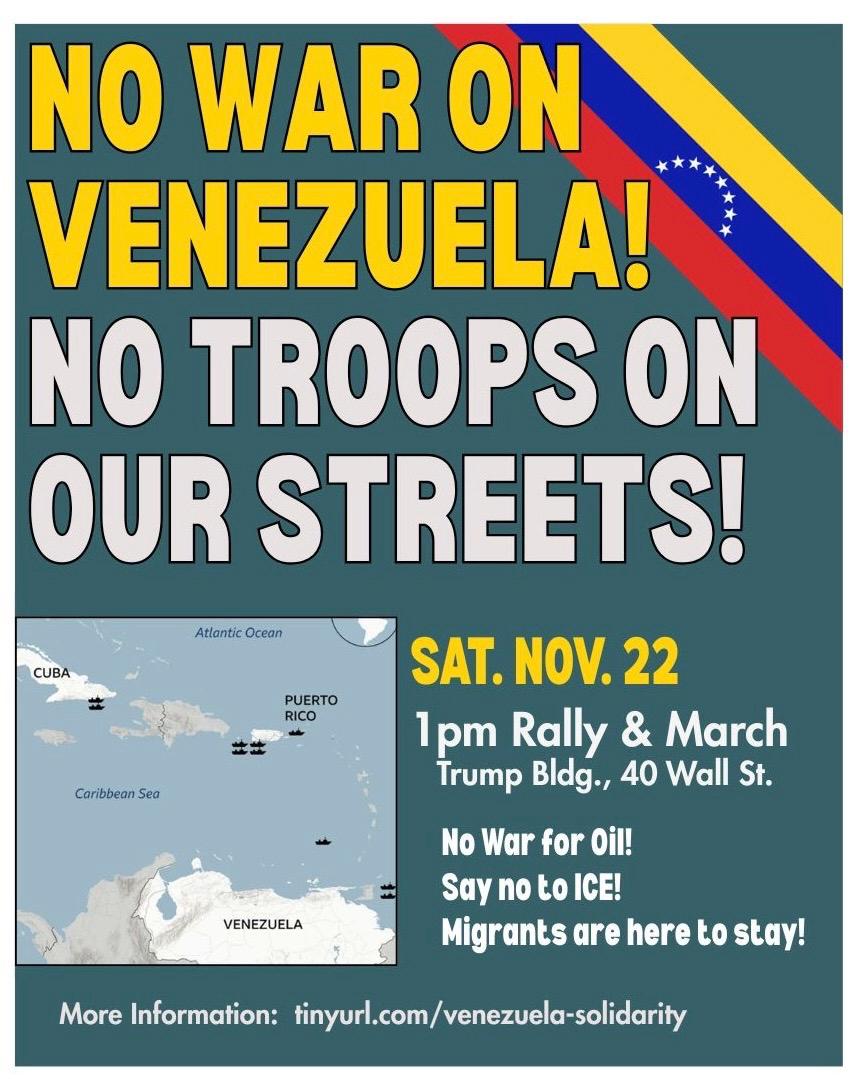Statement from The December 12th Movement
Recent U.S. military provocations of war in South America reveal Black and working-class interest in opposition to U.S. imperialism. The Trump regime and previous U.S. administrations have historically labeled the President Maduro regime anti-democratic. In May of 2025, Trump accused Venezuela’s government of working with the criminal organization Tren de Aragua to wage a small-scale war on American soil, an obvious pretext for regime change. This calls for solidarity with Venezuela, including from our brothers and sisters serving in the U.S. armed forces.
Black and Venezuelan ties go back for centuries. In 1811, during Venezuela’s independence movement, Haitian soldiers, the Western hemisphere’s first free republic, sailed south from Haiti to take up arms to aid Simón Bolívar and Venezuelans in their quest for liberation. This action was not forgotten as the late Venezuelan President Hugo Chavez offered low-cost oil to Haiti following its devastating earthquake in 2010. Chavez also supplied low-cost heating oil to Black and Brown communities in the Bronx and Boston, poor families, homeless shelters, and Native American villages. Venezuela has used its deep oil deposits to provide low-cost fuel to the Caribbean and Latin American partners for decades. Venezuela was also there for victims of Hurricane Katrina.
After coming to power in 1999, Chavez, and later current president Nicolas Maduro, improved the lives of Black and Indigenous people within Venezuela, improving their access to economic, social, and political rights. Prior to U.S. sanctions on Venezuela, broad social spending from the party was responsible for lifting many Black and Brown people out of poverty and expanding literacy to millions.
At present, it is urgent to consider the implications of the solidarity that Venezuela has shown with working-class people of the Americas. More than 60 Venezuelan civilians have been killed by the U.S. since Sept. 2. We are now witnessing the largest U.S. military buildup in the Caribbean since the Cuban Missile Crisis in 1962.
On those ships are Black troops, many that find their origins in the same Caribbean now extorted for Washington’s interest. U.S. naval Admiral Alvin Holsey abruptly retired in the wake of the attacks on Venezuelan boats. Holsey, a Black man, resigned after expressing concerns about targeting civilian or non-military vessels. Legal experts agree with Holsey, suggesting that simply characterizing drug cartels as terrorists did not give the administration any additional authority to use lethal force. Holsey should be a beacon for all servicemen — but especially Black and Brown.
As Malcolm X said:
“When the Black man was asleep, he was anyone’s tool, he was anyone’s watchdog, he was anyone’s houndog, hunting dog, but today the Black man in America is beginning to think for himself. As he begins to think for himself, he begins to ask himself what he is fighting for. And what has he gotten out of all of the fighting that he has already done? And as the Black man begins to ask himself this question, then you will find that many of them begin to wonder what do we have to fight for.”
What is the reality back at home for American troops? Trump’s administration withheld SNAP benefits from working-class Americans as a bargaining chip in a political negotiation. Americans do not exercise the broad social spending of Venezuela to alleviate poverty, with the result being record inequality and a new record in household debt of $18.59 trillion, as Americans struggle with the rising cost of living. In addition, U.S. urban populations have found themselves the target of a war within, with troops and secret police (ICE) being unleashed in an obvious political nature. Images of Black and Brown Americans in cities like Chicago being zip-tied and kidnapped have angered many, with calls for answers against actions that stand at odds to democracy. As to our Black and Brown servicemen:
We are calling for solidarity with the Venezuelan people and the ruling party. They have shown their commitment to the working class here in the Americas, and in their dire time, we must return the support. To our servicemen faced with following orders to feed their families, we understand the contradiction. We all face these challenges to survive the capitalist system. We do ask, however, that you read more about Venezuela and its commitment to improving the lives of the poor here in America and the Caribbean.
Join the Struggle-La Lucha Telegram channel

